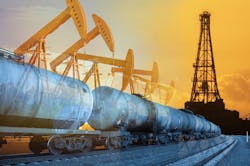Oil and gas act as catalysts for global volatility in recent history
Not many years ago at a general session at the Offshore Technology Conference, an author of best-selling books on the oil and gas industry lamented the truly detestable image many Americans have of it.
How is it, he asked, that one of the richest industries in the world, having performed miracles of ingenuity and perseverance in furnishing the world with the gasolines and the fuels it must have, could lose the public relations battle to an environmental movement that cannot even get its facts straight?
He traced the origin to the Exxon Valdez oil spill that occurred in Prince William Sound, Alaska, in March 1989. An oil tanker bound for Long Beach, California, struck a reef and spilled about 11 million gallons of oil during the next few days. The accident, cleanup and associated litigation were a public relations disaster for the industry.
The knee-jerk, negative reaction many people have to the idea of the oil and gas industry, or even the chemical industry, is a bit appalling. At the very moment they are screwing up their faces, odds are they are riding in a jet airplane or car or sitting in a heated or air-conditioned room.
On the other hand, people on the street might take the issues facing the oil and gas industry more seriously and feel more appreciation for it if the industry itself didn’t make the value of energy seem so fungible.
Today, the price of oil and gas is engaged in one of its cyclical nose dives. It wasn’t that long ago that the cost of jet fuel was exorbitant and long-range commuters were hurting.
The development of technologies that exploit America’s shale deposits has made a real difference. Other countries, such as Australia, also have abundant shale deposits, but it is taking interested parties in those countries years longer to secure property and drilling rights.
Global aspects
Since the oil and gas industry’s advent, oil and gas prices have demonstrated extreme global volatility based on the laws of supply and demand, and this causes great strain in societies. At some point you have to ask, "Does it have to be that way?" It is suspected that volatility persists because some grow rich from it, no matter how many people lose as a result.
Leaving aside the Soviet Union’s collapse and the Cold War’s end, it could be said that the most important events of our time came to pass because of the lengths to which Asian, European and American societies were willing to go to find the energy they craved.
The second oil price shock in 1979, following the first in 1973, happened in that exciting period that included the Iranian Revolution (which resulted in formation of a theocracy), the hostage-taking at the U.S. embassy and the 10-year Iran-Iraq war. It’s not every day clerics seize control of a society or two countries decide to duke it out in World War I-style trench warfare.
American newspapers had extensive foreign bureaus at the time, and keeping tabs on the Iranian Revolution and its aftermath in the New York Times was something akin to reading an epic novel in serial form.
Later, Saddam Hussein invaded Kuwait (which had previously paid him $9 billion for his fight against Iran), and George Bush secured his good name in history by a well-executed pushback.
Following the war fought during George W. Bush’s presidency to depose Saddam Hussein and the subsequent withdrawal of most U.S. forces, insane forces were unleashed in traumatized societies, leading to the declaration of a Caliphate (whose forces occupy Anbar Province and the Sunni heartland), ISIS-sponsored global terrorism and a refugee crisis that is transforming the face of Europe.
On the home front
During most of the events described above, gasoline prices stayed high. What kicked off the price decline was the development of the American shale fields. But most recently, the price of oil fell further with the end of the economic sanctions applied against Iran some years ago because of its progressing efforts to develop nuclear weapons.
Rather than throttle the spigot to maintain price, other oil-producing countries have flooded the market with oil. It is odd to think, though, that if shale development had come sooner, we might never have had to take sides in the Middle East or involve ourselves in their conflicts as much as we have.
Machine, equipment and instrument suppliers have developed advanced means to conserve energy in industrial processes and facilities. Their efforts will not go to waste, but it is a shame the engineering and business community cannot count on a stable environment within which to invest.
